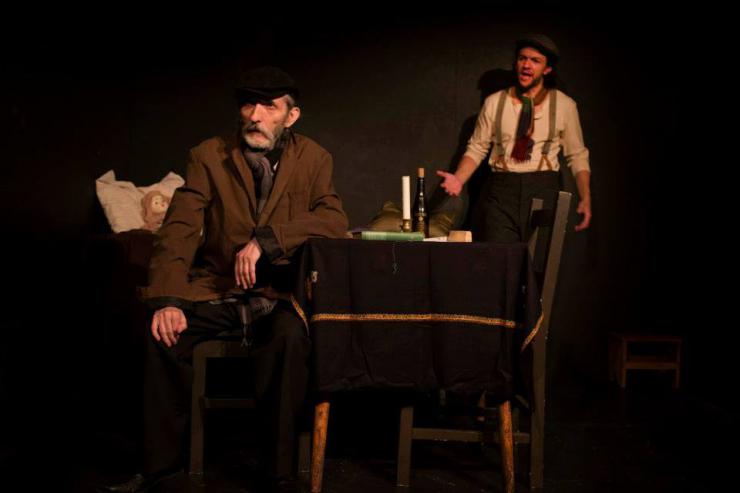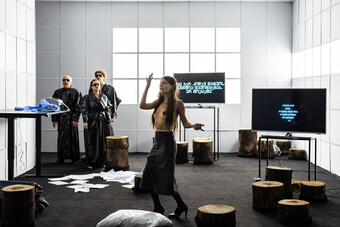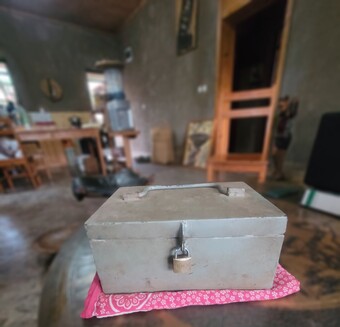Is Curated Fringe Really Fringe?
From the time I realized how much I wanted to write a script and see it come to life, the mysterious world of theatre was as daunting as it was enticing. I had no contacts, no experience, no clue. But in 2013 I wrote Scabs, which was based on events in 1913, and I knew I’d be a fool to let the easy marketing hook of the centenary year go by. I wasn’t optimistic about anyone taking a chance on an unknown female writer; if I wanted anything to happen I was going to have to make it happen myself.
The deadline for Dublin Fringe Festival (DFF) was fast approaching when my idea had barely settled. I naïvely went through the application process anyway, not until later learning that many of Dublin’s creative community feels that for DFF to call itself “fringe” is false advertising when it’s tightly curated, and when so many of its acts are well-established. The application process was challenging, to say the least. Maybe I narrowly missed out, maybe I never had a chance. What I do know is that the extensive application forced me to think about things I wouldn’t have otherwise, like budgets, and set, and target audiences, which left me in a much better position to put on my show when another opportunity came along—the successful but unfortunately short-lived open access 10 Days in Dublin festival.
Producing and directing for the first time was a baptism by fire, and then, the night before get-in, I had a (justifiably) patronizing call from one of my cast to make sure I knew what a tech rehearsal was. I didn’t. This was followed by a call from the director of a production we shared a venue with. He said he “hadn’t really been at rehearsals” and wanted to extend his time in the venue, into ours. I put my foot down, but wondered how the hell I would handle it if the following afternoon he just refused to leave. Get-in, and I was finally thinking we might pull this off, when, ten minutes before the shops closed and fifteen minutes out of town, we realised that our contract with the venue stipulated fabrics had to be fireproofed.

Ideas of what fringe theatre should be are as diverse as the acts in the largest festivals. But can the ideals of a fringe—daring, a bit anti-establishment, fresh new voices—be realized if a fringe festival is curated?
When I took part in 10 Days in Dublin I bought into the attitude of many of my fellow participants; that we were Dublin’s “real” fringe, while DFF was a bit of an imposter. The difference, for me, was in the democracy of giving everyone a chance, especially people who, like myself, had a blank canvas of a creative CV.
Ideas of what fringe theatre should be are as diverse as the acts in the largest festivals. The phrase comes from “fringe of another festival,” and the website worldfringe.com points out they “come in all different shapes and sizes; some are open access, first come first served, created by lottery, juried, part programmed or a mix of them all.” But can the ideals of a fringe—daring, a bit anti-establishment, fresh new voices—be realized if a fringe festival is curated?
Kris Nelson, current artistic director of DFF, is used to being told DFF isn’t fringe, and has plenty of very convincing counterarguments.
“Our remit is to be a lot of different things: our core value is a focus on new. We have a devotion to premières,” he says, highlighting that 65 of this year’s 80 shows will be world premières. “We’re a mix of ‘this is where you can be creative and do wonderful things,’ and ‘this is where you can be entrepreneurial.’ We have all these different voices alongside each other in the same program, with hybrid, experimental, and populist work—that’s fringe.”
10 Days in Dublin described itself as open access on the basis that no one gets turned away. That was good enough for me, but some of the people I met at pre-festival meetings insisted that it couldn’t claim to be uncurated, as the festival coordinators had a role in assigning a venue and dates to each act. I’m sure many of us have happily passed a sociable evening or two discussing and debating what counts as open access, how much a festival can be programmed before it loses its “part programmed” status, and whether a lottery system is fair. But curation is almost universally seen as exclusive. Even Nelson admits it isn’t always ideal.
“There’s always one that got away—I walk away saying ‘I wish we’d found a spot for that one.’”
Open access can sometimes be “too open,” with little to no quality control. A fellow playwright I spoke to confided that he “wasn’t convinced of the validity of some fringe festivals anymore.” He complained about paying to see performances which were essentially companies using a festival to develop incomplete work before it played elsewhere, with actors still reading from scripts. “Edinburgh,” he said, “can be likened to the internet—all noise and very little substance. The quality work is there but hidden by so much dross.”
Mitzi Dalton, former theatre coordinator for 10 Days in Dublin, conducted a survey of arts audiences, The survey was an online questionnaire and a total of 100 responses were gathered through arts festivals’ social media networks and the organization Arts Audiences. Participants were selected based on past attendance of arts festivals, with no exclusion based on gender, age, socioeconomic background, or geographic location. Seventy-five percent of her respondents believed that curated festivals were higher quality.
Quality is difficult to define and predict, but it’s what everyone wants. The audience have generously allocated a portion of their income and a slice of their valuable leisure time to a show. As theatre professionals, it’s in our best interests to produce high quality work and be associated with high quality events. Being selected from a competition brings prestige. But I’ve been blown away by independent shows, and have been left thoroughly underwhelmed by shows in prestigious, elite festivals so often that I don’t buy into the idea of curation guaranteeing quality. What curation is about, Nelson tells me, isn’t quality but relevance, and fringe festival submissions should be “a litmus test for where we’re at as a society.”
For example, Ireland has undergone a cultural shift in recent years as far as suicide is concerned. We’ve started talking about it, instead of hiding our heads in the sand as our coroners reported “open verdicts of accidental death.” About 50 applications with central themes of loss, mourning, and suicide came in for Dublin Fringe Festival 2015, which must have made for a jovial atmosphere in the office as Nelson and his team processed them all. They couldn’t program every single one, so they selected some as representative, and crucially, looked for that one production saying something that no one else was saying.
The strongest argument for creation, from a theatre artist’s perspective, is that it allows festivals to better support their participating acts, which would be especially valuable if many of those artists are first-time or early career. “Curation allows us to support the artists, with more information, to support them more directly,” Nelson insists. DFF organizes a host of valuable programs, workshops, and informal networking events for their participants. These workshops, as well as the prestige of being selected, are a key reason a place in Dublin Fringe Festival’s program is so highly coveted. But admirable as their artist support program is, it doesn’t answer the question I started with of whether a curated event can really be considered fringe or not.
What curation is about, Kris Nelson—artistic director of Dublin Fringe Festival—tells me, isn’t quality but relevance, and fringe festival submissions should be ‘a litmus test for where we’re at as a society.’
A core value of every fringe festival should be supporting younger artists. DFF’s 65 premieres out of 80 shows is impressive by any standards, but even if it’s unintentional, the marketing, tech, and all round know-how you’d need to get past a jury would exclude most beginners from curated festivals. However, DFF is worthy of praise for the support they provide even to artists outside their festival. Their monthly informal “elevenses” social/networking events at their permanent headquarters are open to everyone, and they make free office and rehearsal space available to artists year round. I used “Fringe Lab” once, and have only positive things to say about it, although it proved impossible to get back into—it’s first come, first served, and understandably books up pretty fast. I’ll also admit to using their highly detailed application form and budgeting template to plan other projects—another way they, perhaps unintentionally, support artists outside their festival.
One thing upon which we can all agree: every time you’re involved with something that goes onstage (even just a reading), is an invaluable learning experience. I remain indebted to Dublin’s short-lived open access fringe festival for giving me a chance to learn. As well as becoming a better writer, I had to come to grips with contracts, cover letters, and synopses. This helped me accrue my publication credits, build the profile of a creative magazine I directed for two years, and even apply for completely unrelated jobs.
In 10 Days and afterwards, my show did well critically and commercially. I just needed a chance to prove myself—a chance I wouldn’t get in Dublin now that we have no open access fringe festival.
I wanted, through this essay, to answer the question as to whether juried fringe festivals can really be considered “fringe.” There’s no clear answer to that, because there’s no clear definition of what fringe theatre is, and there shouldn’t be. I still prefer to think “real fringe” is open access, full of naïve first-time idiots who only know what a tech rehearsal is because one of the cast told them the day beforehand, and who will move house twice afterwards with a fireproofed bed sheet, because that damn thing still owes you.
At the end of the day, we play for our audiences. Dalton’s research project reported that only 40 percent of arts audiences knew that there was a difference between open access and curation, and most of the audience members I spoke to didn’t care, one way or the other. They just want an evening’s entertainment.









Comments
The article is just the start of the conversation—we want to know what you think about this subject, too! HowlRound is a space for knowledge-sharing, and we welcome spirited, thoughtful, and on-topic dialogue. Find our full comments policy here
For me (associated with the Toronto Fringe in the early '90s) I really think a key element is un-curated in the sense that no one is turned away. We already have curated theater festivals and we call them "theater festivals." Calling it "Fringe" always used to imply access to those outside the mainstream. I've seen some extraordinary work by people who are not in the theater "community" - a group of high school students who did an memorable job with Daniel McIvor's "Never Swim Alone," and a Jungian therapist performing a biographical piece on Carl Jung. Nobody in the professional theatre community knew these people or would have considered presenting their work.
It's a practical problem that venues might need to be assigned, and schedules developed, and one wants to do those as fairly as possible, but I don't think that takes much away from providing audiences access to work they might otherwise not have had access to.
And for North American artists, the U.S. and Canadian festivals work together to create a network and schedule that can give those adventurous enough to do so an opportunity to tour well beyond their own city boundaries.
I totally agree about Edinburgh. As a first time Fringe performer and attendee this year I was overwhelmed with choices, and dismayed to learn that the average fringe show audience was 10. There is just too much to choose from, and little hope of distinguishing yourself from the masses without significant marketing and know how. I think I would have had a better chance of finding an audience if I had just booked an engagement in a major city and invited everyone I know.